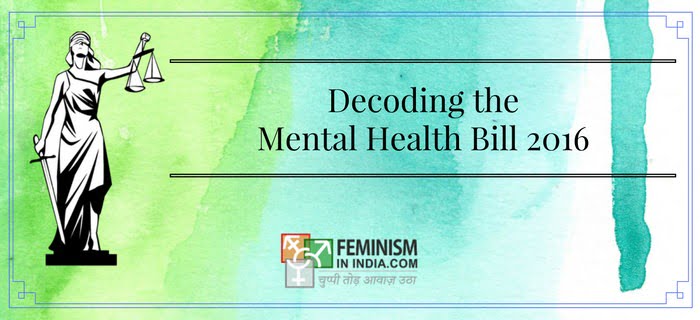The Mental Health Bill 2016 was passed by the Lok Sabha and is scheduled to be debated soon in the Rajya Sabha. It introduced some revolutionary changes to the draconian Mental Health Act and is touted as one of the more open-minded bills in India; especially with the history of legislations which are biased against many ideas like homosexuality, gender etc. What follows is a point-based analysis of the changes made to the bill.
Change in Definition
The definition of mental illness under the Mental Health Act was “any mental disorder other than mental retardation” which is both vague and unaccommodating. The amendment now reads
“a substantial disorder of thinking, mood, perception, orientation or memory that grossly impairs judgment, behaviour, capacity to recognise reality or ability to meet the ordinary demands of life, mental conditions associated with the abuse of alcohol and drugs, but does not include mental retardation which is a condition of arrested or incomplete development of mind of a person, specially characterised by sub normality of intelligence.”
This new definition is wide-ranging and is enough to cover all forms of mental illnesses. It also ignores the bias that exists against milder forms of mental illness.
Decriminalization of Suicide
According to the original Mental Health Act and Section 309 of the Indian Penal Code, suicide was a criminal offense. This was originally based on idea of how a person is not only an individual but also a participant of the state, and a contributor to the state’s economic, social and political growth. Although a reasonable assumption, this greatly allocates a person’s role to simply a player of the state, and limits his/her personal agency. Furthermore, this goes against a general ethos of consideration for people who are mentally ill, because people who attempt suicide not only have to deal with mental and physical illness, but are also criminals under the law.
The decriminalization of suicide exhibits a great level of attention to attempters of suicide, and also understands that suicide is a sensitive issue which should not be worsened by criminalization. Furthermore, the Bill goes one step further and penalizes the degrading or abusing of mentally ill people as an offense, and recognizes forceful institutionalization as a crime.
Advance Directives
Advance directives are a radical new provision to the Act which state that a mentally ill person has the choice to decide on whether he/she wants treatment, and who or which institution he/she wants to go to (according to Section 5). This means that the state has recognized that a mentally ill person is not necessarily incapable of making their own decisions; and it gives them the space to decide so they will be more comfortable during diagnosis. The directive has to be approved by a mental health professional, however. The decision to be admitted as a patient shall be taken only by the person in question, unless he/she is in a state where he/she is not capable of making the decision, for example if he/she is in coma.
Medical Health Review Commission and Board
The Bill establishes the necessity and thereby directs that a medical health review commission and board should be established, which will ensure and set up district medical boards across India. It will also be in charge of reviewing procedures for issuing advance directives, and also aid the government in formulating policies that are sensitive to mental health issues, when required. Additionally, the board will also have the power to change an advance directive, appoint representatives, receive and take action on complaints with regard to lack of mental health facilities and choose the decision of a patient over the decision of his/her representative medical officer. This is stated in Chapters VII and VIII of the bill.
Usage of certain medical methods
The Bill has now banned usage of electro-shock therapy and electro-convulsive therapy for children. It specifies that the usage of muscle relaxants and anaesthesia is a must before using it with adults. Additionally, before performing psychosurgery, the decision and patient situation must be familiarized and approved by the district medical board. Furthermore, the usage of chains in institutions and sterilization of persons, for the treatment of mental illness is now banned. The bill also specifies the exact procedure for admission and treatment of a mentally ill person, which has to be compulsorily followed by institutions.
Role of Government Authorities
A Central Mental Health Authority is to be established to ensure the adequate establishment of mental health institutions in states, develop standards that they have to follow, receive complaints, advise the government on mental health matters, train law enforcement officials in the regulations specified by the Act and maintain a register of available mental health facilities. The government is also to provide free legal services, ensure that patients have access to medical records, and can avail of their rights: to equal treatment, protection from degrading and inhuman treatment, and to not have to travel very far to access treatment.
Also, it is necessary that the state mental authorities to provide upto 72 hours of emergency admission. Furthermore, every mental health establishment has to be registered with the state or central authority, and adhere to the specifications mentioned in the bill. Additionally, all medical officers in jails as well are to be trained in basic mental healthcare. State governments should establish mental health authorities within nine months of the passing of the bill. Finally, if a family of a mentally ill person is unable or unwilling to take care of the person, then it is the responsibility of the government to make the necessary arrangements for the same. This is laid out in Chapter VI of the bill.
Issues with the Bill
Although a radical and open-minded bill as seen above, it has issues as well. It only recognizes psychiatrists as medical officers, and makes no mention of counsellors and psychologists. For many mental illnesses, medication is only the last step; and counselling is an integral cog in diagnosis. In most cases, issues are resolved with only counselling. Additionally, it gives a lot of importance to and sees mental institutionalization as the main solution to mental illness. Institutionalization is required only in the direst cases; and is unnecessary for mental ailments that simply require good counselling, lifestyle changes and/or limited medication. Furthermore, there will definitely be issues with implementation, as research has shown that mental health professionals are far and few. The Bill places a lot of emphasis on medical and scientific methods, when in fact a lot of times non-medical methods like art, dance and cultural elements are used in therapy, to aid counselling; which are not fully medical methods.
Therefore, although the Bill is extremely important in today’s scenario with the higher rise in mental illness, it is important to implement the clauses in a methodical manner while showing sensitivity to people affected.
Further Reading
Below are critical analysis of the Mental Health Bill 2016 by people living with mental illnesses and/or working on mental health issues.
Unshackling the Recent Mental Health Care Bill 2016 by Jhilmil Breckenridge
Should We Rejoice?: A Critical Analysis Of the Mental Health Care Bill 2016 by Val Resh
What does the Mental Health Care Bill Mean For Persons With Mental Illness? by Shampa Sengupta
About the author(s)
A firm believer in freedom, rights and equality. Happy to be offended and offer opinion on the lack of awareness of social issues. A student of assertion (and Liberal Arts); much prefer dancing to talking.




